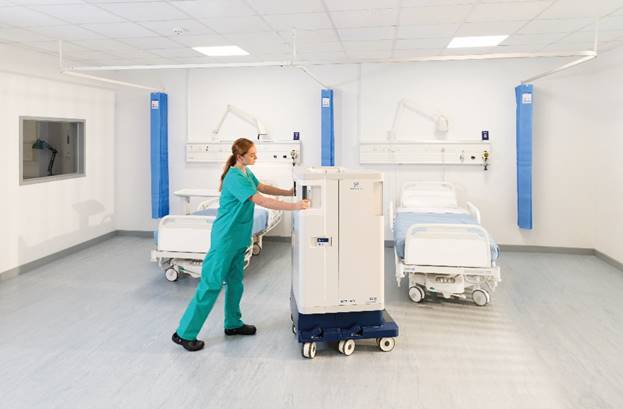UK-based GAMA Healthcare’s Instant Patient Isolation Room, Rediroom, is recognised in Australia’s International Good Design Awards for Design Excellence

A pop-up isolation room designed by an Australian A&E nurse and developed by UK-based GAMA Healthcare has been awarded an international prize in recognition of its worldwide impact on infection prevention and control.
Rediroom was the brainchild of nurse, Anna Ballantyne, who was concerned about keeping infectious patients on an open ward until a private room was available.
And GAMA’s Instant Patient Isolation Room was conceived to resolve the problem.
This week it picked up a prize in Australia’s International Good Design Awards for Design Excellence.
This is a timely and clever design that has the potential for enormous impact
With development moving to the UK, GAMA worked in collaboration with industrial designers, infection prevention experts, and clinicians to build a final product suitable for the most-common healthcare-associated infections – many of which spread through respiratory droplets.
Rediroom is the world’s-first mobile isolation room.
Safe isolation
Transforming from a mobile PPE cart into a fully-operational patient isolation room around an existing bed space, it can also be deployed while the person is still in bed – safely isolating bed-bound patients.
Rediroom offers protection from the most-common infections with the physical barrier and hands-free entry/exit helping to limit spread of contact pathogens and reduce the risk of hand transmission.
And inbuilt HEPA and carbon air filters remove 99.5% of respiratory droplets down to 0.3 micrometres before returning air to the open ward – more efficient than an N95 respirator.
Commenting on its impact, particularly during the COVID-19 pandemic, the Good Design Awards jury commented: “This is a timely and clever design that has the potential for enormous impact.
“Minimising cross contamination in hospitals is a global aim, particularly at the present time, and the simple process of setting up the room and usage of colour-coded and numbered tabs is really intuitive.
“The HEPA filtration and ease of decontamination are critical features that have been addressed and the design also solves common challenges such as portability, being able to easily see the patient, and ensuring the entry/exit stays closed. Amazing!”
Its release comes as healthcare-associated infections (HCAIs) are on the rise globally.
Worldwide appeal
Within NHS England, respiratory tract infections (pneumonia and other respiratory infections) account for 22.8% of all HCAIs, urinary tract infections for 17.2%, surgical site infections (SSI) for 15.7%, clinical sepsis for 10.5%, gastrointestinal infections for 8.8%, and bloodstream infections for 7.3% of infections.
And these are estimated to cost the NHS in England £2.7bn per year.
Since its launch, Rediroom has generated millions in sales, with the NHS purchasing more than 300 units.
Minimising cross contamination in hospitals is a global aim, particularly at the present time, and the simple process of setting up the room and usage of colour-coded and numbered tabs is really intuitive
They are now in place in organisations including University Hospitals of Derby and Burton NHS Foundation Trust, Royal Preston Hospital, The Shrewsbury and Telford Hospital NHS Trust, Wye Valley NHS Trust, and Guy’s and St Thomas’ NHS Foundation Trust in London. And it is believed they have helped these trusts increase their isolation capacity by up to 12%.
Guy Braverman, joint chief executive and co-founder at GAMA Healthcare, said: “I am thrilled to say Rediroom has been recognised in Australia’s International Good Design Awards for Design Excellence.
“With Rediroom you can create an effective isolation area and retain the flexibility to move it around anywhere.
“We are pleased to hear patients have said they feel reassured being cared for in the Redirooms, knowing they won’t be exposed to other patients.
“But this isn’t just about COVID, there are a number of diseases which spread through contact and droplets such as flu and norovirus, so these patients should not be put on open, shared wards.”